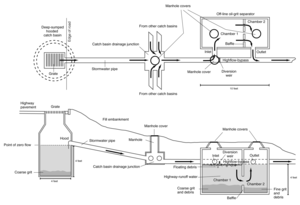Difference between revisions of "Pretreatment"
Jenny Hill (talk | contribs) |
Jenny Hill (talk | contribs) m |
||
| Line 1: | Line 1: | ||
| − | [[File:Oil-grit separator USGS 2002.png|thumb| | + | [[File:Oil-grit separator USGS 2002.png|thumb|Example oil-grit separator USGS 2002 (Wikimedia commons)]] |
Pretreatment devices may be constructed in close association association with one or more [[inlets]]. Different configurations of each exist to accommodate any design. | Pretreatment devices may be constructed in close association association with one or more [[inlets]]. Different configurations of each exist to accommodate any design. | ||
{{TOClimit|2}} | {{TOClimit|2}} | ||
Revision as of 14:39, 12 June 2018
Pretreatment devices may be constructed in close association association with one or more inlets. Different configurations of each exist to accommodate any design.
Overland sheet flow[edit]
The following pretreatements are recommended where sheet flow is being directed to a BMP (e.g. a bioretention cell) receiving flow from the edge of an impermeable surface such as an asphalt parking lot or a paved plaza:
A gravel diaphragm typically requires less setback between the catchment and the BMP. Where space permits, these three designs can be used in combination to even greater effect!
Concentrated overland flow[edit]
Where a curb cut, a disconnected downspout or a swale directs surface water to a point, increasing the flow rate, one or more of the following pretreatments should be considered:
- Forebays (well suited for bioretention cells)
- Sand filters (well suited for underground infiltration)
- Screens and racks
- Also see stone for erosion control at inlets.
Concentrated underground flow[edit]
This type of pretreatement is dominated by proprietary systems, some of which have undergone verification under the Environmental Technology Verification (ETV) program.
| Type | Description | ETV products | Other products (not verified) |
|---|---|---|---|
| OGS Baffles | Baffles slow flow, encouraging larger, heavier particles to drop out of the water column. A skimmer may also trap floating debris, oils and grease. | - | |
| Hydrodynamic OGS | The shape causes rapidly flowing water to form a vortex which forces the larger, heavier particles are outwards and downwards into a lower chamber. Floating debris, oils and grease are trapped behind a baffle or in small tank area, towards the top of the main vortex chamber | ||
| Cartridge filters | Uses advanced membrane technology adopted from water treatment plants. | - | |
| Catchbasin inserts | Great for improving water quality in retrofit situations |
External links[edit]
This article is particularly heavy on proprietary systems and information. Please inform us of any omissions or broken links using the box below:
